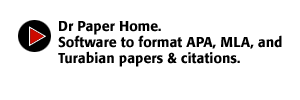Avoid Jargon and Vernacular (Slang)
The purpose of writing an essay is to communicate your ideas and findings with your readers.
Jargon
The use of obscure technical terms -- sometimes called jargon -- that may be unfamiliar to your
readers is in direct opposition to your primary goal in writing the paper. If you find that
technical terms are necessary, make sure you define your terms for your readers.
The Vernacular (Slang) and Colloquialisms
Vernacular and colloquial phrases may be terms that are quite familiar to your readers, but are not appropriate
in formal writings that require wording with precise definitions (e.g., We "sized up" the participants;
"practically everyone").
Colloquialisms, too,
often have "affective" connotations that are unacceptable in research writing (e.g., "cops")
Find terms to report your findings and observations that are explicit -- but that will be
understood clearly by your readers.
Numbers
- Spell out numbers below 10 (five films, six-way connection, two studies).
- Use numerals for numbers 10 and above (9 to 12 times a week).
- Add s only to make a plural of a number, with no apostrophe (the 1990s).
- Spell out frequently used fractions and common expressions (one-third, Fifth of May).
- Use metric abbreviations with figures (9 km) but not when written out (several meters from the wall).
- Use the percent symbol (%) only with figures (2%) not with written numbers (two percent).
- Treat ordinal numbers like cardinal numbers (the second participant in the 40th experiment . . .).
- Use combinations of written and Arabic numerals for back-to-back modifiers (two 5-question tests).
- Use combinations of numerals and written numbers for large sums (2 thousand employees).
- Use numerals for exact statistical references, scores, sample sizes, and sums (multiplied by 6, or 10% of the sample).
- Spell out large numbers at the beginning of a sentence (Forty nights after we landed on that desolate shore . . .).

